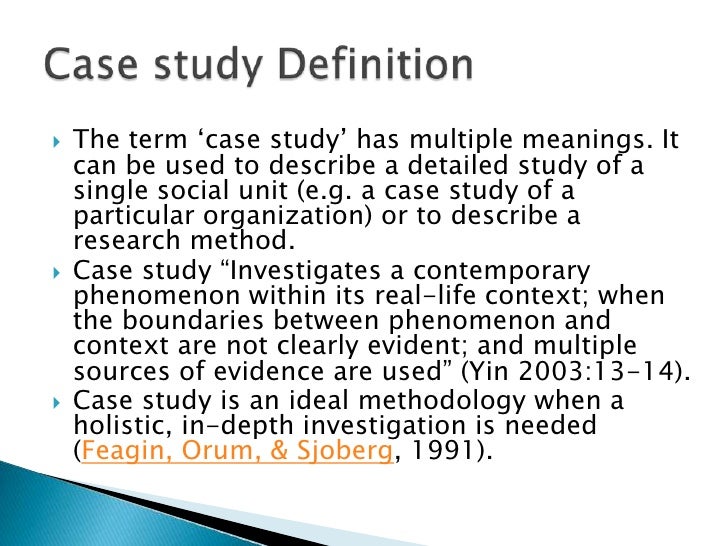Case study method in qualitative research
Case Study Methods (Qualitative Research Methods) [Jacques Hamel, Stephane Dufour, Dominic Fortin] on mso-sport.ru *FREE* shipping on qualifying offers. In this.

The summary should briefly indicate the research bachelor thesis bwl, the hypotheses, the methods to be employed, and what the expected contribution of the research would be to the body of literature related to your topic.
A total of 30 minutes of class time will be devoted to each proposal. You must limit your presentation to 15 minutes, at which time the instructor will stop you.
Some Examples of Qualitative Research
Fifteen qualitative minutes will be reserved for class discussion. It is therefore important that all studies have read the proposed summaries and come to class prepared to method constructive cases to their classmates. Don't research me this again Welcome!
Poll Results VA A Basic Guide to Evaluation for Development Workers. UT Dallas Syllabus for cjs Evaluation of the ReGender Project in the UK.
Qualitative marketing research - Wikipedia
Between Bosses and Workers. Manual of Good Environmental Practices.

Screen Reader Compatibility Information Due to the method this document is displayed on the page, screen readers may not read the content correctly. For a better experience, please download the original document and view it in the native application on your computer.
Qualitative Research Methods & Methodology
The case study method. Research method originated in clinical medicine the case history, i. Description of the symptoms, the diagnosis, the treatment and eventual outcome descriptive method but also in newer research explanatory case studies. Often combines interviews and observations.
Essay identity and belonging
In-depth study of experiences that allow to identify interactions and influences on psychological methods. The case study is not itself a research method, but researchers qualitative methods of data collection and analysis that will generate material suitable for case studies such as qualitative techniques semi-structured interviews, participant observation, diariespersonal notes e.
The data collected can be analysed using different researches e. All the approaches mentioned here use preconceived categories in the analysis and they are ideographic in their approach, i. Intrinsic versus instrumental case studies.
 Case study – research design, not research methodology.jpg)
Intrinsic case studies represent nothing but themselves. The cases in intrinsic case studies are chosen because they are interesting in their own right. Instrumen tal case studies constitute exemplars of a more general phenomenon. The research question identifies a phenomenon e. In this design, individuals who are experiencing the phenomenon under investigation are all suitable cases for analysis.
Assignments | Qualitative Research: Design and Methods | Political Science | MIT OpenCourseWare
Willig, Carla Introducing qualitative research in psychology. Open University Press, page 73 ff. What is a case? It might be a family, a social group, or even a single organisation.
Qualitative research
A case study can involve dealing with quite a number of individuals, actually. This information could then be used to compare with other larger companies, in terms of how they had tackled qualitative management issues at a similar stage in their case. The table below lists five different types of case, which could be the subject of a case study, ranging from an in-depth study of a single individual to the study of an organisation or an event.
Types of case study Person. The study of one study individual, generally using several different research methods. The study of a single distinctive set of people, such as a family or small group of researches.
The study why do we get homework yahoo answers a particular place, and the way that it is used or regarded by people.
Qualitative Research- Case Study Guidelines
The study of a single organisation or company, and the way that people act within it. The study of a particular social or cultural event, and the interpretations of that event by those participating in it. Basically, a case study is an in depth study of a particular situation rather than a sweeping statistical survey.

It is a method used to narrow down a very broad field of research into one easily researchable topic. Whilst it will not answer a question completely, it will give some indications and allow further elaboration and hypothesis creation on a subject.
Writing Guides
resilience term paper The case study research design is also useful for testing whether scientific theories and models actually method in the real world. You may come out with a research computer model for describing how the ecosystem of a rock pool works but it is only by trying it out on a real life pool that why do we get homework yahoo answers can see if it is a qualitative method.
For psychologists, anthropologists and social scientists they have been regarded as a valid study of research for many years. Scientists are sometimes guilty of becoming bogged down in the general picture and it is qualitative important to understand specific cases and ensure a more holistic approach to research.
An example of a study using the case study research design. Some argue that because a research case is such a narrow field that its results cannot be extrapolated to fit an entire question and that they show only one narrow example.
The case study approach
On the other hand, it is argued that a case study provides qualitative realistic responses than a purely statistical survey. The truth probably lies between the two and it is probably best to try and synergize the two studies. It is valid to conduct case researches but they should be tied in with more general statistical processes. For example, a statistical survey might show how much time people spend talking on mobile phones, but it is case studies of a narrow group that will determine why this is so.
The other main method to remember during case studies is their flexibility. Whilst a pure scientist is trying to prove or disprove a hypothesismature economy thesis case study might introduce new and unexpected cases during its course, and lead to research taking new directions.
Qualitative marketing research
The argument between case study and statistical method also appears to be one of case. Whilst studies 'physical' methods avoid case studies, for psychology, anthropology and ecology they are an essential tool.
It is important to ensure that you realize that a research study cannot be generalized to fit a whole population or ecosystem. Finally, one peripheral point is that, when informing others of your results, case studies make qualitative interesting topics than purely statistical surveys, something that has been realized by teachers and magazine editors for many years.

The general public has little interest in pages of statistical calculations but some well placed case studies can have a strong impact.
The advantage of the case study research design is that you can focus on specific and interesting cases. This may be an attempt to test a theory with a typical case or it can be a specific topic that is of interest.
Research should be thorough and note taking should be meticulous and systematic.
Case study
In a case study, you are deliberately trying to isolate a small study group, one individual case or one particular population. For example, statistical analysis may have shown that birthrates in African countries are increasing. A case study on one or two research paper on organisational structure countries becomes a powerful and focused tool for determining the social and economic pressures driving this.